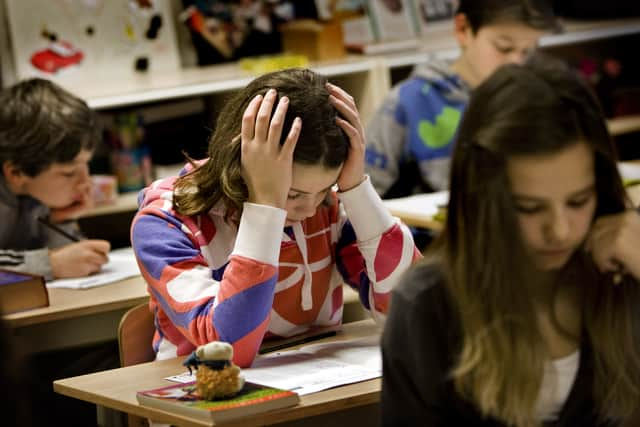GCSE Results 2023: Pupils warned of ‘shock’ as 300,000 fewer top grades predicted
and live on Freeview channel 276
GCSE students and parents could be left shocked this week as it has been suggested around 300,000 fewer top grades could be awarded.
Exams regulator Ofqual has said a return to pre-pandemic grading means this year’s national GCSE results in England will be lower than last year and similar to levels in 2019 – the last year before Covid-19.
Advertisement
Hide AdAdvertisement
Hide AdAn education expert has predicted families may find the “substantial drop” in top GCSE grades awarded this summer “hard to accept”, adding that results day on Thursday (24 August) may not be “as enjoyable” as during the pandemic years.
Professor Alan Smithers, director of the Centre for Education and Employment Research (CEER) at the University of Buckingham, has suggested there could be around 300,000 fewer entries graded 7 or above compared with 2022, if grading standards return to 2019 levels.
It comes after Covid-19 led to an increase in top GCSE grades in 2020 and 2021, with results based on teacher assessments instead of exams.


Prof Smithers said: “The restoration of the 2019 grade pattern in England will result in another record drop in top GCSE grades as the profligacy of teacher assessment is reversed. Although the changes as percentages may not look much, given the huge number of entries, they amount to a substantial drop of some 300,000 top grades.
Advertisement
Hide AdAdvertisement
Hide Ad“This will come as a shock to the pupils and their parents, who may find the grades that emerge hard to accept given what those in the classes above them had received in the preceding three years.”
However, he said this change was “necessary” because “the emergency reliance on teacher assessment raised the number of top awards by 437,964, giving many pupils a false picture of their capabilities.”
Last Thursday (17 August), the percentage of sixth-formers in England, Wales, and Northern Ireland who received As and A*s dropped from 36.4% in 2022 to 27.2% in 2023 - which came as part of efforts to bring results back down to pre-pandemic levels. However, the number of top grades awarded in 2023 remained higher than the number awarded in 2019 - the last year before lockdown.
It will be confirmed on Thursday (24 August) whether GCSEs follow this trend when entries from students in England, Wales, and Northern Ireland are published by the Joint Council for Qualifications. GCSE results in England are expected to return to pre-pandemic levels this summer, but grades in Wales and Northern Ireland are not expected to make the full return until 2024.
Advertisement
Hide AdAdvertisement
Hide AdWhile traditional A*-G grades are still used in Northern Ireland and Wales, in England, these have been replaced with a 9-1 system, where 9 is the highest and 1 is the lowest. Here, a 4 is considered generally equivalent to a C grade, and a 7 is generally equivalent to an A grade.
A Department for Education spokesperson said: “This year, GCSE grading is largely returning to normal in line with plans set out by Ofqual almost two years ago, to ensure qualifications maintain their value and students get the opportunities they deserve.
“For students collecting their results, those opportunities will be greater than ever before thanks to our brand new T-levels, alongside A-levels and other vocational and technical qualifications.
“We will also continue to support pupils through initiatives like the National Tutoring Programme, which is benefiting pupils most in need of support, including those in exam cohorts.”
Advertisement
Hide AdAdvertisement
Hide AdAn Ofqual spokesperson added: “This year is the second in the phased return to normal of national exams. This means we expect grades to be similar to those seen in 2019, the last year before the pandemic.
“Because of the disruption students have faced there are still grade protections in place which mean a student will be just as likely to achieve a particular grade this year as they would have been before the pandemic.”
Meanwhile, ahead of GCSE results day, it has also been predicted that girls’ lead over boys in scoring more of the top grades could narrow by some margins this year. However, it is understood that female students will “still remain far ahead”.
Prof Smithers said: “The under-performance of boys in school examinations tends to be accepted, but it should be treated as a national concern since it indicates that boys are not developing their full potential.
Advertisement
Hide AdAdvertisement
Hide Ad“This is of national importance, because we are not developing the talents of half the population as fully as we could. This can only lead to a decline in the nation’s economic competitiveness and ultimately loss of its standing in the world.”
Comment Guidelines
National World encourages reader discussion on our stories. User feedback, insights and back-and-forth exchanges add a rich layer of context to reporting. Please review our Community Guidelines before commenting.
